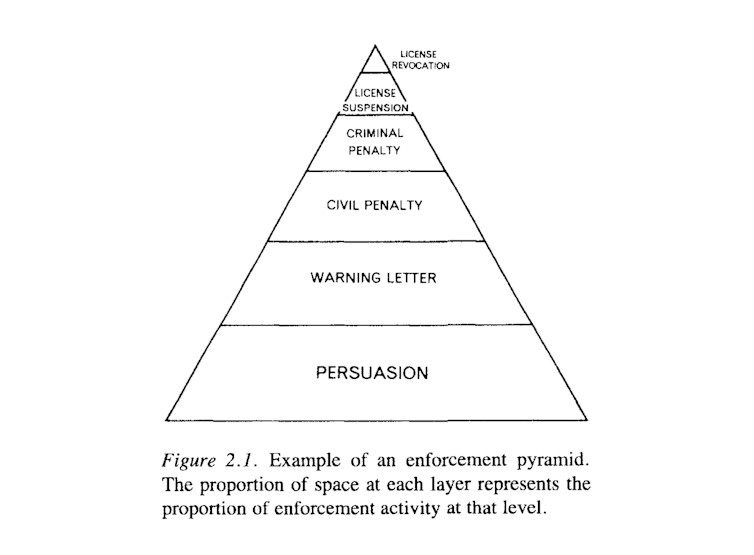Economist John Adams and Analyst Martin North examines the latest disclosures relating to the Cash Transaction Restriction Bill, and considers the implications in the count down to the end of the Senate submission window which expires on 15th November.
Tag: Regulation
The Black Economy, QE And Rates On ABC Illawarra
I had the chance to discuss the cash transaction legislation, negative interest rates and QE on ABC Illawarra today.
Corrupt Canberra says your Freedom is Out of Scope
Economist John Adams and Analyst Martin North discuss the recent Treasury FOI response relating to the Cash Restriction legislation which was open (briefly) for public comment.
https://treasury.gov.au/sites/default/files/2019-11/foi-2580.pdf
https://www.adamseconomics.com/post/official-letter-of-compliant-against-the-australian-treasury
https://www.aph.gov.au/Parliamentary_Business/Committees/Senate/Economics/CurrencyCashBill2019
Who Audits The Auditors? [Podcast]
There is a Government Inquiry running on the Audit firms in Australia: “Regulation of Auditing in Australia“.
Robbie Barwick form the CEC and I discuss the implications.
Submission are open to 28th October and you have your chance to have a say on this important subject.
It also links with the Cash Ban too!

Who Audits The Auditors?
There is a Government Inquiry running on the Audit firms in Australia: “Regulation of Auditing in Australia“.
Robbie Barwick from the CEC and I discuss the implications.
Submission are open to 28th October and you have your chance to have a say on this important subject.
Government launches retirement income review
The Federal government has today announced that it will be commissioning an independent review of the retirement income system, via InvestorDaily.

This review was recommended by the Productivity Commission in their report Superannuation: Assessing Efficiency and Competitiveness and comes 27 years after the establishment of compulsory superannuation.
The review will look at the three pillars of the existing retirement income system, being the Age Pension, compulsory superannuation and voluntary savings.
In doing so, the review will cover the current state of the system and how it will perform in the future as Australians live longer and the population ages.
Through its work, the review will establish a fact base of the current retirement income system that will improve understanding of its operation and the outcomes it is delivering for Australians.
The review will be conducted by an independent three person panel.
Mr Michael Callaghan AM PSM, a former Executive Director of the International Monetary Fund and a former senior Treasury official will chair the review, together with fellow panellists Ms Carolyn Kay, who has more than 30 years’ experience in the finance sector across roles both in Australia and overseas, including as a member of the Future Fund Board of Guardians, and Dr Deborah Ralston, who is a Professorial Fellow in Banking and Finance at Monash University, a member of the RBA’s Payments System Board and most recently chair of the Alliance for a Fairer Retirement.
A consultation paper will be released in November 2019 and the final report provided to Government by June 2020.
The Review will establish a fact base of the current retirement income system that will improve understanding of its operation and the outcomes it is delivering for Australians. It aims to identify how the retirement income system supports Australians in retirement, the role of each pillar in supporting Australians through retirement, distributional impacts across the population and over time and the impact of current policy settings on public finances.
FSC CEO Sally Loane said the FSC will work closely with the review to ensure continuing improvements to Australia’s retirement income system, particularly through the superannuation system.
“Superannuation consumers receive significant benefits from competition and choice, and this will be an important focus of the FSC’s approach to the Review,” Ms Loane said.
“However, this review should not delay important reforms that the Government has already committed to that will significantly improve consumer outcomes in superannuation.
“These include the introduction of a ‘default once’ framework to prevent unintended multiple accounts, as recommended by both Commissioner Kenneth Hayne and the recent Productivity Commission review of superannuation, and legislating an obligation for trustees to consider the retirement needs of their members.”
The FSC will also suggest to the review that the government should retain its policy of increasing the Superannuation Guarantee to 12 per cent. The FSC also suggests that superannuation laws should be simplified and red tape in the sector should be removed including barriers to rationalising legacy products.
“The FSC looks forward to advocating strongly for these positions during the Review process over the coming year,” Ms Loane said.
AMP welcomed the review and said a strong retirement system is essential to supporting the wellbeing of Australians now and into the future.
“This is a once-in-a-generation opportunity to improve our current retirement system to make sure it adequately serves everyone’s needs. Now is the time to have the debate on this issue,” an AMP spokesperson said.
The Cash Ban Breakthrough – The Game’s Afoot!
Latest on the cash ban, which was presented in Parliament today, with Robbie Barwick from the CEC.
On 19 September 2019, the Senate referred the provisions of the Currency (Restrictions on the Use of Cash) Bill 2019 [Provisions] to the Economics Legislation Committee for inquiry and report by 7 February 2020.
Submissions close 15 November 2019.
https://www.aph.gov.au/Parliamentary_Business/Committees/Senate/Economics/CurrencyCashBill2019
If you’d like to be part of a delegation to visit your local MP, call the CEC on 1-800 636 432 to be put in touch with others in your area.
Use and share these links for finding MPs and Senators. Click the link, and find the heading State/Territory in the box titled Refine Search on the right hand side of the page. Click on your state and call as many MPs and Senators as you can, on their Parliament House numbers, starting with 02-6.
A Cash Flash!
More on the Cash Restriction Bill with Robbie Barwick from the CEC.
The Liberal/Nationals joint party room agreed to support the bill, despite the 4,000 or so public submissions not posted by Treasury, and the details of the bill yet to be released. Democracy at work?
Use and share these links for finding MPs and Senators.
Click the link, and find the heading State/Territory in the box titled Refine Search on the right hand side of the page. Click on your state and call as many MPs and Senators as you can, on their Parliament House numbers, starting with 02-6.
Bupa’s nursing home scandal is more evidence of a deep crisis in regulation
British health-care conglomerate Bupa runs more nursing homes in Australia than anyone else. We now know its record in meeting basic standards of care is also worse than any other provider. Via The Conversation.

This is more than a now familiar story of a corporation putting shareholders before customers. It is also about another abysmal design failure in regulation.
Health care is meant to be one of our most regulated sectors. In this case, Bupa’s facilities were inspected and certified by the Aged Care Quality and Safety Commission.
The regulator’s inspectors found 45 of Bupa’s 72 nursing homes failed health and safety standards. In 22 homes the health and safety of residents was deemed at “serious risk”. Thirteen homes were “sanctioned” – with government funding being withheld and the homes banned from taking new residents.
Yet none of this appears to have spurred Bupa’s management into action, according to media reports. Flurries of inspection reports and written warnings over months and years only underlined that the regulatory tiger, even if it had teeth, had a very soft bite.
Responsive regulation
We have seen examples of equally insipid regulation in other areas. In the building sector, for example, a range of regulatory flaws including outsourced building certification have led to shoddily built and dangerous apartment construction.
In the financial sector, the banking royal commission castigated the industry regulators – the Australian Securities and Investments Commission and the Australian Prudential Regulatory Authority – for their unwillingness to enforce rules.
“The conduct regulator, ASIC, rarely went to court to seek public denunciation of and punishment for misconduct,” noted royal commissioner Ken Hayne. “The prudential regulator, APRA, never went to court.”
This failure is due to more than individual agency shortcomings. It’s an unintended consequence of the design of “responsive regulation” – the system that has superseded command-and-control regulation over the past three decades.
Responsive regulation was popularised by Australian sociologist John Braithwaite and American law professor Ian Ayres in the early 1990s. It was intended to overcome the pitfalls of the command-and-control model, which involved regulators employing large numbers of inspectors to look for non-compliance.
From about the 1970s it had become increasingly evident this model wasn’t working. It was also very expensive. Consider, for example, the cost of having fire and health and safety inspectors visit every single building site, particularly when most builders were doing the right thing. The cost and intrusiveness of the system fuelled calls to do away with regulation .
Too big to fail
Ayers and Braithwaite saw their model as a way forward. “Responsive regulation is not a clearly defined program or a set of prescriptions concerning the best way to regulate,” they explained. “On the contrary, the best strategy is shown to depend on context, regulatory culture and history.”
Responsive regulation assumes that in most cases the enterprises being regulated are interested in compliance and will respond to light-touch directives. It assumes that often compliance failures are due to ignorance or inadequate procedures. Its approach is to give parties a chance to amend their ways.
But there’s a potentially huge flaw in the responsive regulation model. What happens when an organisation is so large it is deemed too big to fail, or deems itself so?

This seems to have been the case with a number of financial companies whose misdeeds were exposed by the banking royal commission. It seems it might have been the case with Bupa.
In such cases, because of the timidity of the regulator or the confidence of the enterprise, the warnings might just go on and on. The company continues to book its profits – which may well eclipse any penalty it might have to pay if crunch time does ever come.
Markets have their limits
This design flaw highlights a more fundamental problem with governments positioning themselves as rule makers and leaving the rest to the “market”.
Markets are designed to facilitate exchange on the basis of profits. The profit motive means market participants look for the lowest-cost option. In aged care this means paying the lowest possible wages, possibly to unqualified staff, and cutting corners to cut costs.
Markets are very useful for increasing individual choices and efficiently allocating resources, but they are not suited to every task. They fail when factors other than profit ought to be considered.
We therefore need to think about the design of regulatory systems more holistically, as part of a broader social process.
The pioneers of responsive regulation certainly understood this. They emphasised flexibility, taking into account context, culture and history.
What those three things now tell us, given widespread regulatory failure across industries, is that government should not resist stepping in to provide important public services where the private sector cannot or will not do so at an acceptable level. Nor should it be afraid to act through empowered regulators, with ressources and powers to fulfil their mandates.
Author: Author: Benedict Sheehy, Associate professor, University of Canberra
